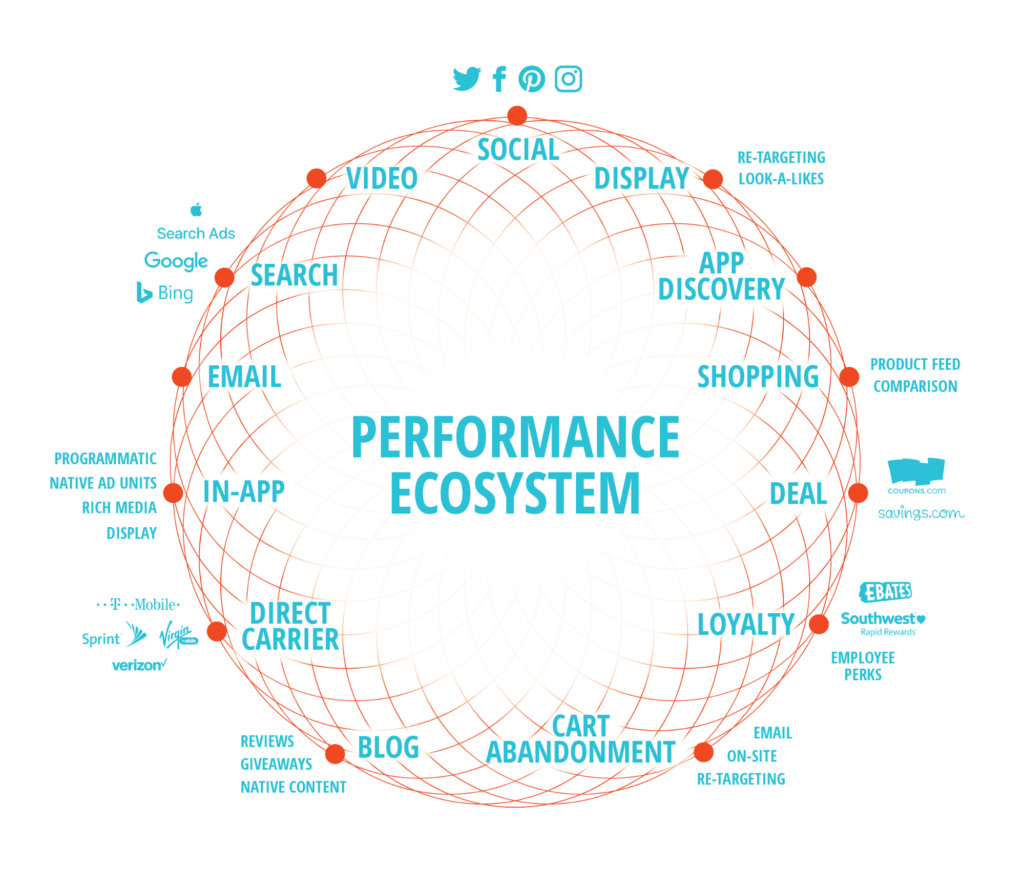- Affiliate Marketing, Affiliate Marketing & Performance Marketing Articles, Affiliate Marketing & Performance Marketing Blog, All, Featured
Navigating the Affiliate Marketing Channel with Craig McGlynn Episode 3: Major Players in the Affiliate Ecosystem
- Perform[cb]

Table of Contents
This article is the third in an ongoing informative series written by Craig McGlynn, the VP of Agency Sales at leading Affiliate Management Agency Perform[cb]. The series covers topics of interest to people in the Affiliate Industry, considering launching an affiliate program, or scaling an existing affiliate program.
The affiliate ecosystem is filled with so many different players and buzzwords that it can be a bit overwhelming to marketers newer to the industry. Generally speaking, a brand setting up an affiliate program will encounter each of the following key players: marketers, publishers, agencies, and tracking platforms. If you think of the affiliate ecosystem as if it were a stool, and each of those representing one leg of said stool, it’s a bit easier to understand. So let’s dive into each of leg – and their related buzzwords.
Marketers/Advertisers
Probably the one with which most of us are already familiar is the Marketer or Advertiser. These are the people responsible for driving ecommerce sales for their company/brand and that leverage affiliate marketing in their marketing mix. Some examples of titles you might expect to come across for these folks would be Director of User Acquisition, Affiliate Manager, Director of Partnerships, and Growth Manager.
Partners/Publishers
Any website that drives new customers/sales to your brand through an online link is considered a partner or publisher. There are multiple categories of publishers, but they broadly bucket into:
- Deal and Coupon Sites – considered “lower-funnel”, these are largely sites that expose consumers to your discounts and promotions
- Loyalty Sites – also considered “lower-funnel”, these sites offer cashback after purchsing
- Content Sites – these upper- to mid-funnel sites include bloggers, editorial, product reviewers and listicles
Agencies
These are 3rd party companies (often called OPM’s – Outsourced Program Management companies) that function as extensions of the brand’s internal marketing team in launching and managing their programs. Later in this series, we’ll discuss the value proposition and usefulness of agencies, but in short, an affiliate program can be intensely time consuming, requiring a high level of expertise, and many brands choose to hire an agency to help them build and run a successful program.
Tracking Platforms
There are a few different flavors of technology platforms that track clicks, sales, payments, and other functions that come frrom affiliate transactions between the marketer, the partner, and the individual consumer. I’ll dive deeper into tracking platforms in a future post, but to keep it simple and high level, the tracking platforms most companies use fall into a few different buckets:
- Fully owned tracking – Platforms that have varying degrees of functionality.he most basic fully owned tracking platforms are Shopify Affiliate Plugin, WordPress Affiliate Plugin, and Refersion.com. Also in this category is Tune/Hasoffers, which has a significantly higher level of functionality and is typically used by very large, more sophisticated brand programs who want to own their affiliate program.
- SaaS platforms – Including familiar names like Impact, Partnerize, and Partnerstack, SaaS platforms are feature-rich and come with a massive publisher universe, making recruiting a breeze. These platforms are often self-service, but do come with some client services. They are a far-cry from full program management, though.
- Full service platforms – This category includes some of the pioneers of the affiliate marketing space such as Rakuten (formerly Linkshare), Commission Junction, and AWIN. These platforms are aligned with the SaaS platforms above from a feature perspective, but also offer an option for full program management.
TIP: Check out the newest proprietary tracking platform to hit the space.
- Custom platforms – There are other custom platforms companies such as sub-affiliate networks (Skimlinks, Sovrn) and specialty networks (Avantlink and Linkconnector). These are networks that also function as publishers driving traffic to offers and/or brands.
While this is just a broad overview of the key players, there are many more tactics and traffic sources in the performance ecosystem as demonstrated in the graphic below.
It’s a lot of stuff, right? Don’t let it overwhelm you. Catch your breath and consider partnering with an expert affiliate agency that can help you navigate all of these traffic sources, creating a custom strategy that is right for your brand and your KPIs.
Want to learn more about how the affiliate channel can work for you? Connect with an affiliate management expert today!
Stay tuned for our next installment and if you missed them, check out the other articles in this series:









